- Home
- Jeff Mariotte
Serpents in the Garden Page 14
Serpents in the Garden Read online
Page 14
Meena rose from her bench and went to the girl. She wrapped her arms around Joslen and drew her close. “Shh,” she said. “I know how you feel, Joslen. Believe me, I know the worry that gnaws at your heart.”
“Nyran is brave,” Joslen said. “More brave, I fear, than he is wise. When he returned with the pot—the pot that cured my father—I called him a hero. He survived the wilderness, and the mugato. I fear he now believes himself indestructible. He as much as told me so, when he told me he was going.”
“Joslen speaks truth,” Elanna said. “Nyran has never feared for his own safety. Even as an infant, he would face danger with a smile. But going alone, into Victory, might be more than even he can withstand.”
Tyree pushed himself to his feet, weariness and hunger forgotten. Let someone else deal with the petty squabbles between neighbors. He had promised James that he would not interfere, but he’d made no such pledge regarding Nyran. “We haven’t much time if we’re to catch the boy before he reaches the lowlands. Who’s with me?”
“Me,” Enjara said. He rose and stood beside Tyree.
“I’ll go,” Keran said. “The boy has guts, I’ll give him that.”
“And me,” Meena said. She took a step toward Tyree, but Joslen grabbed her arm.
“No, Meena!” Joslen pleaded. “Stay with me. I need someone. I had thought that I had no friends in Freehold, but now I know that isn’t true. I can’t bear the thought of losing them all, though.”
“He’s my son,” Elanna said. “I’m going.”
After Elanna, a groundswell of volunteers spoke up. Tyree wanted to keep the party small, so it could move fast without drawing attention to itself. With luck, they could catch up to Nyran before he reached Victory. He tapped Gayan and Renaya on the shoulders. They were brother and sister, neither wedded or with children, their parents dead. They were strong, swift of foot, and deadly with rifles or bows. “We six,” Tyree said. “We will catch Nyran and bring him safely home.”
“Thank you,” Joslen said, still clutching Meena’s arm. “I do have friends here, I know that now. And I appreciate every one of you.”
“We will find him, Joslen,” Elanna said to her. “And I will make sure he understands how lucky he is to have a friend like you.”
* * *
“We are not making wery good time, are we?” Chekov asked. He and Uhura and Scott were gathered in the quarters provided to Uhura for the voyage to Neural.
The ship was the Potemkin, a Constitution-class starship that had already undergone refitting after she had taken some significant damage. Scott had haunted engineering, making a nuisance of himself, until McCollough, the chief engineer, had told him, in no uncertain terms, that if he didn’t stay out of her engine room, he’d be thrown in the brig.
“We’re at warp eight, man,” Scott replied. “To push her any harder would risk tearin’ her apart.”
“I’m sure Chekov understands that,” Uhura said. She sat on the edge of her bunk. Chekov was slouched in a chair, and Scott leaned against the bulkhead. “He’s just frustrated.”
“It’s a ways to go,” Scott reminded them. “You know the reality.”
“You are right, Scotty,” Chekov said. “And so is Nyota. The galaxy is wast, and I am frustrated by our progress. Or the lack of it.”
“I knew McCollough in the Academy,” Scott said. “Not well, but we came up together. She’s good, and she’s askin’ everything she can from the engines. If I had time and tools, I could tweak her a wee bit—”
“It’s not your ship, Scotty,” Uhura reminded him. “I spoke to Kaysing, the communications officer.” Uhura’s face was devoid of expression, which told Scott all he needed to know. She was a woman for whom smiling was as natural as breathing. She was worried. “There’s still been no communication from Admiral Kirk.”
Scott had done all the reassuring he could. He shared their fears. The mission had been so secret that only a handful of people knew about it. Although Kirk was only a rear admiral, he had enough juice that he’d been able to pressure Command not to get in his way.
Now, Command had started to have second thoughts. According to Admiral Kucera, what had sent Kirk back to Neural was an uptick in Klingon activity in the area. He had wanted to check it out, personally. Admiral Kucera had bowed to his request, but the more time passed without any word, the more she worried about the possibility of a Starfleet admiral falling into Klingon hands.
“James Kirk can take care of himself,” Scott told Uhura and Chekov. He had used the same words with Admiral Kucera. “Plenty of folks have made the mistake of underestimating him. They rarely do it twice.”
“I know that, Scotty,” Uhura said. “That doesn’t stop me from being anxious.”
Scott nodded. “We’ll get there,” he said again.
He only hoped they would get there in time.
Seventeen
“Documents?” Kirk asked. He patted where his pockets would be, if this outfit had any. He smiled, gave an uneasy chuckle. “Must have left them in my other pants.”
The guard stalked toward them. Kirk could feel Rowland tense beside him, coiled, ready to react. The uniformed man glared at them as he advanced, a stern look Kirk could remember seeing on his own father’s face a few times.
Those memories weren’t happy ones.
The man reached out his right hand—and then burst into laughter. The others with him joined in, all but falling on the ground at the success of the prank.
Kirk forced a laugh and glanced at Rowland to make sure he was doing the same.
“D-doc-documents!” the guard roared. “You are not from here, are you?”
“No,” Kirk said. “We’re fairly new in town.”
The guard stood, hunched over, hands above his knees, trying to catch his breath. His face was flushed. “From where?”
Kirk waved a hand, generally toward the south. He wasn’t sure what he was indicating, but he made sure it wasn’t Freehold. “That way,” he said. “You wouldn’t know it.”
“New Hope?”
“Past there,” Kirk said. “But nearby, yes.”
“Lovely country.”
“If you like that kind of place, yes.”
The guard straightened his spine, and the mirth left his eyes. “Well, newcomers, the mine is off-limits. Unless you’d like to work it. That, I could arrange. Otherwise, keep away.”
“Yes, sir,” Kirk said. He turned away, trying hard to appear casual. Rowland joined him, and they headed back up the same road they had taken.
Behind them, they heard the laughter start up again. One of the guards said, “Documents!”
When they were out of earshot, Rowland said, “That was . . .”
“I know.”
“You don’t know what I was going to say.”
“It doesn’t matter. I agree. It was a lot of things, none of them good.”
“But we got away with it.”
“Keep walking,” Kirk said. “And don’t count your chickens . . .”
“Before they hatch,” Rowland finished. “We used to say that at home, too.”
“I think everybody did.”
They covered a couple more blocks, and when they were able to blend in with the city’s populace again, Kirk started to relax.
“What now?” Rowland asked. “Doesn’t look like we’re going to see inside that mine.”
“I’m sure the smelter is guarded just as diligently,” Kirk said.
“So where do we find Klingons?”
Kirk glanced at the sky. He wanted to get back to Freehold by dark. “I’m not sure we do,” he said. “Today, anyway.”
“We’re runnin’ out of time, Admiral.”
Kirk cut him off. “Rowland, we have a job to do here, and we’re staying until it’s finished.”
“Aye, aye, sir.”
“Come on, let’s get out of here. I’d like to get to Freehold before the mugatos come out to play.”
* * *
Having
changed back into their Freeholder garb, they started out under a sky piling up with dark clouds. They had just reached the foothills when they heard the crack of rifles, followed by a scream.
Kirk froze, listening. “That wasn’t far away,” he said after a quiet moment.
“Not at all.”
“We need to check it out.”
“I thought you wanted to get back.”
“I do. But there are only two sides to this conflict. If somebody’s getting shot at, it’s likely that the Freeholders are involved.”
“Sir,” Rowland said, “it’s not our fight. We came here to find out what the Klingons are up to.”
“Mister Rowland.” Kirk was unexpectedly angry, and he let it show in his tone. “The other reason we came was to find out if giving the Hill People flintlocks was a mistake. We know the Klingons are arming the Victors, and that makes the Freeholders’ fight our fight.” The admiral started toward where the sounds had come from, at a run. He didn’t look back to see if Rowland followed.
As he got closer, Kirk could hear voices. The words were indistinct, but the tone was one of command. Working his way nearer still, he could see people just thirty meters or so downhill from his position.
Slavers.
They had killed someone—a body lay facedown in the grass, and Kirk could see enough of the head to know multiple gunshot wounds distorted it. Six other people stood around the body, their weapons on the ground, encircled by twenty or more Victors, all of them bearing lever-action rifles.
Kirk recognized the five captives.
The crunch of dry grass alerted Kirk to Rowland’s presence. His aide crouched beside him, looking at the tableaux.
“That’s Tyree,” Rowland whispered.
“Tyree, Nyran, Elanna. I don’t know the names of the others, and I can’t tell who the dead one is.”
“They’ll be put to work in the mine,” Rowland said.
“Unless someone recognizes Tyree,” Kirk replied. “He’s a symbol to those who love freedom. He’d be more valuable as a hostage. They could parade him through the streets, make a spectacle of him. His capture would be a blow to all of Freehold, and beyond. It would be dispiriting, to say the least.”
“What do we do? We can’t fight that many of them.”
“We could have if we’d been with them. Nine of us against twenty? I’d take those odds. But the Freeholders have already disarmed. That leaves us without a lot of options.”
“Do we have any options? Go back to Freehold and raise an attack party?”
“No time for that,” Kirk said. “Whatever we do, it’s got to be now.”
“Orders, sir?”
Kirk contemplated the question for a moment. A couple of the slavers handed over their guns to their comrades and moved toward the captives with lengths of rope. They tied each captive’s hands behind his or her back, then looped the rope around his or her throat a couple of times, then moved to the next captive and did the same, linking them in a chain. If any of them tried to balk, the ropes would tighten on the necks of those around them.
They didn’t have much time. Shooting wouldn’t help—the captives would be sitting ducks, and two against twenty was poor odds. They could just let the Victors take the Freeholders. But they might never see any of them alive again, and Tyree would be a particularly valuable prize.
“We’re going to be captured, too,” Kirk said.
“We’re what?”
“I want to be able to keep an eye on Tyree, try to protect his identity if I can. And we need to see what goes on in the mine, right? So we let ourselves be taken.”
“Admiral, that could be suicide.”
“Or it could accomplish what we came here to do.”
“Well, I just don’t see how gettin’ us killed will—”
“Mister Rowland,” Kirk interrupted. “You said you’d been studying my record. You must have an idea of how many times someone’s tried to kill me.”
“Lots.”
“Do I look dead to you?”
“No, sir.”
“That’s right.”
“Still . . .”
“Still, nothing. We’ve got to move or we’ll miss our chance.”
“Our chance to become slave labor?”
“Our chance to succeed at our mission.”
“We could follow ’em, sir, wait for a chance to take ’em by surprise.”
“They outnumber us. And they’re not far from Victory; we wouldn’t get much of a chance.”
“Do you always have an answer for everything?”
“Not always,” Kirk admitted. “But usually, yes.”
Rowland blew out an exasperated sigh.
Kirk didn’t blame him. If it hadn’t been his idea, he would have hated it, too. As it was, he wasn’t all that fond of it.
As the Victor slavers tightened the bonds on the Freeholders, Kirk stepped out from the cover of the trees. He held his rifle loosely in his hands. “There must be some mistake,” he called. “Those are friends of ours.”
He heard Rowland coming behind him, going along with the plan after all.
The Victors spun around, leveling their weapons at the newcomers. “Stop where you are!” one demanded.
Kirk recognized the danger of his situation. Some of the slavers were tense, fingers on their triggers. It wouldn’t take much to start them shooting, and if they did, he and Rowland were dead. His hope was that having secured their prisoners, they’d be relaxed, their guards lowered, and he’d be able to give himself up without any trouble.
He watched their eyes, knowing that if one was going to shoot, he’d telegraph it there first. But as he and Rowland stood there, he moved his hands away from his body and held his rifle by the barrel, fingers well away from the trigger. A couple of the slavers approached, and Kirk offered the gun to the nearest one. Another one took Rowland’s weapon. At that point, the rest of the group shifted their gun barrels away, placing their fingers outside their trigger guards, and it was clear there would be no more shooting. Kirk doubted that the dead one had been threatening them—it was probably standard practice to take out one victim when they first moved in, to show the rest they meant business. To slavers, the dead were worthless. They wanted their prey healthy, whole, and able to work.
The Victor who had taken Kirk’s gun handed it off to another man. He carried himself like the man in charge, expecting others to simply know what he wanted done, and to do it. He was dressed in clothing similar to what Kirk and Rowland had worn in the city, and he had a thick, black beard and a flyaway shock of dark hair. “You are dressed like them,” he said, indicating the captive Freeholders. “You are from Freehold?”
“Not . . . originally,” Kirk said. “But we’ve been staying there.”
“These are your friends?”
“Yes, they are.”
He grabbed Kirk’s vest with the hand not holding his rifle and hauled him down the slope. Kirk could easily have broken his grip, but only at the possible cost of bringing guns back into play. He let the man drag him toward the other captives. When they were close, the man released Kirk, shifted his grip on his rifle, and swung the stock into the brow of one of the Freeholders Kirk didn’t know.
The man’s forehead split open under the blow, and blood spurted from the gash. The other Freeholders shouted in alarm, and the knees of the injured man buckled. As he sagged, the lines around the throats of the others drew taut. They caught him, hoisted him back to his feet. He groaned and blinked at the blood flowing into his right eye, unable to raise his bound hands to wipe it away. But he shook his head and regained his balance. He would have a bad bruise for a few days, but he’d live.
“Do you know why I did that?” the Victor asked Kirk.
“I have . . . no idea,” Kirk said.
“To show you—and them—that I am capable of anything. I can be kind, and I can be crueler than you could imagine. If you cooperate, if you please me, I will be your friend. Your best friend, perha
ps, at a time when you feel like you have no friends at all. Or I can be your worst enemy, your nightmares made flesh. And most important? It is all up to you. You can choose which side of me you want to see. The kind side, or the cruel one. You do not even have to tell me—I will know, by your actions, which you want to see. So . . . do you feel cooperative?”
Kirk wasn’t sure how he could be any more cooperative. He and Rowland had come out of hiding and given up without a struggle. But he didn’t want to point out to the man how easy their capture had been, lest he find it as suspicious as it really was. “I don’t see that we have much choice.”
“You truly do not,” the man said. He turned to one of those who obeyed him without question. “Add them to the string!”
Kirk and Rowland allowed the Victors to tie their wrists. As they had done with the others, they encircled the men’s necks with the rope and knotted it to Tyree, who was the last Freeholder in line. But because a separate rope had been used, what happened to Tyree and the others would not risk strangling the Starfleet officers, and vice versa.
Tyree turned his head as far as his bonds would allow. “James,” he said. “Why have you given yourselves up?”
“We need to get inside that mine,” Kirk replied. “This was the only way to do it.”
“But, as prisoners?”
“Nobody’s going to let me take the tour.”
“I do not understand.”
“Bad joke, Tyree. Never mind.” He didn’t want to tell the man that a bigger part of the reason was that he wanted to keep an eye on Tyree himself, to try to make sure the Victors didn’t realize what a prize they had stumbled across. “Who did they kill?”
Tyree craned his neck around even farther. The ropes bit into his flesh, and there were tears in his eyes. “Enjara,” he said. “They fired from the trees, killing him, then swooped in and took the rest of us.”
“Enjara? The man I . . .”
“Yes. You saved him one day, only for him to die on another.”
“I am sorry.”
“As am I. These people are vicious. Brutal.”
“I’m trying to find a way to put an end to it all, Tyree. To the taking of slave labor, to the fighting. To the dying.”

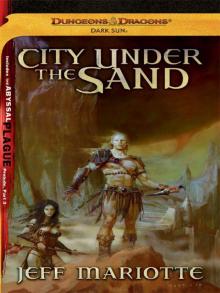 City Under the Sand
City Under the Sand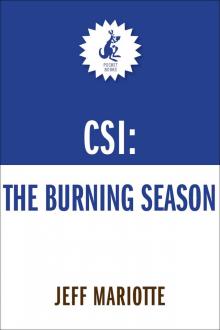 The Burning Season
The Burning Season Sanctuary
Sanctuary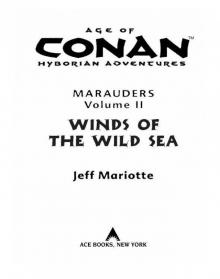 Winds of the Wild Sea
Winds of the Wild Sea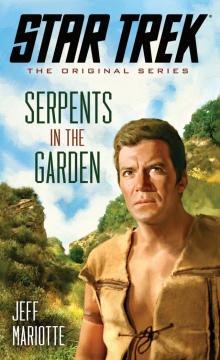 Serpents in the Garden
Serpents in the Garden Close to the Ground
Close to the Ground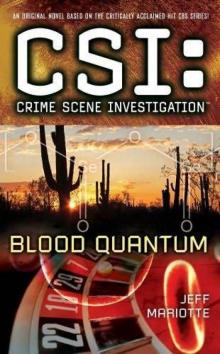 Blood Quantum
Blood Quantum Brass in Pocket
Brass in Pocket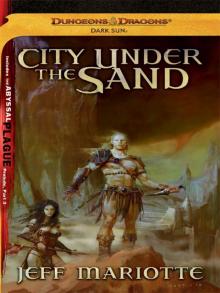 City Under the Sand: A Dark Sun Novel (Dungeons & Dragons: Dark Sun)
City Under the Sand: A Dark Sun Novel (Dungeons & Dragons: Dark Sun)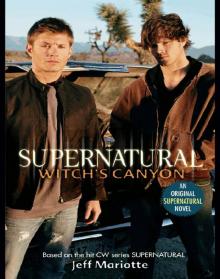 Witch's Canyon
Witch's Canyon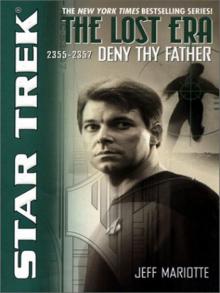 STAR TREK: The Lost Era - 2355-2357 - Deny Thy Father
STAR TREK: The Lost Era - 2355-2357 - Deny Thy Father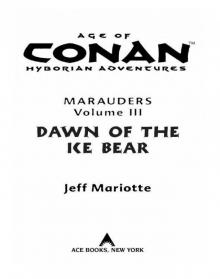 Dawn of the Ice Bear
Dawn of the Ice Bear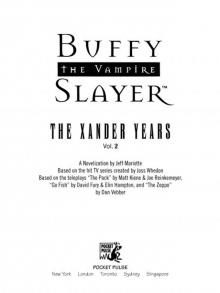 The Xander Years, Vol.2
The Xander Years, Vol.2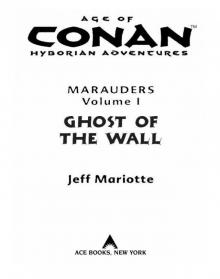 Ghost of the Wall
Ghost of the Wall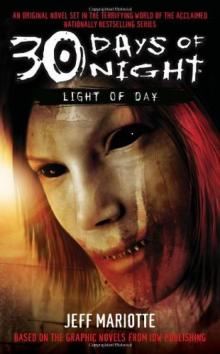 30 Days of Night: Light of Day
30 Days of Night: Light of Day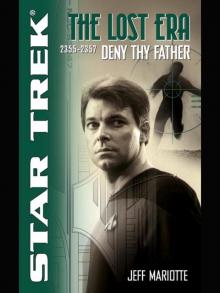 Deny Thy Father
Deny Thy Father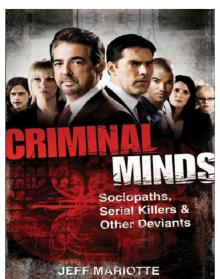 Criminal Minds
Criminal Minds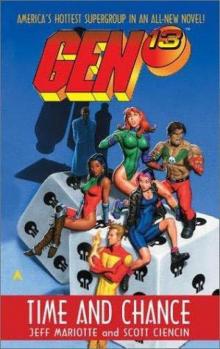 Time and Chance
Time and Chance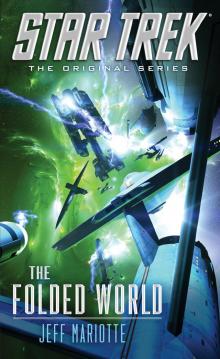 The Folded World
The Folded World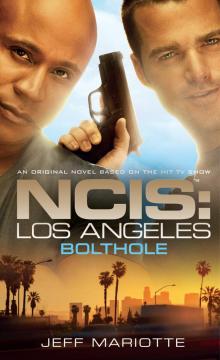 Bolthole
Bolthole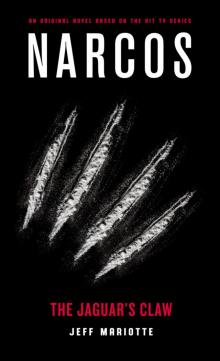 Narcos
Narcos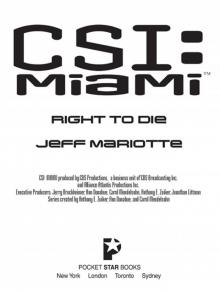 Right to Die
Right to Die